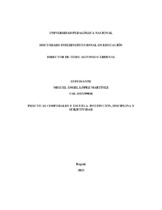Prácticas corporales y escuela. Institución, disciplina y subjetividad.
Citación
Fecha
2023Autor
López Martínez, Miguel Ángel
Director / Asesor / Tutor
Cárdenas Páez, Jesús Alfonso
Metadatos
Mostrar el registro completo del ítemResumen
La tesis buscó reflexionar críticamente en torno a las prácticas institucionales nacidas de las distintas construcciones teóricas de cuerpo-lenguaje que, en la actualidad, la escuela oficial bogotana ha implementado sobre sus procesos de formación. En el entendido de que dichos procesos interfieren directamente sobre los modos de subjetivación de los estudiantes, la investigación adoptó el propósito de comprender la importancia recíproca del cuerpo en la construcción del lenguaje, así como la forma en que la escuela a través de los usos y prácticas corporales genera procesos de formación y, por tanto, de subjetivación.
Inicialmente, se recorre históricamente las construcciones epistémicas de cuerpo y lenguaje nacidas en la cultura occidental; posteriormente, se profundiza en algunas de las prácticas más icónicas de la escuela occidental y finalmente, se presenta una categorización a partir de la relación entre el acervo de los dos momentos anteriores junto con una observación sobre los modos en que institucionalmente se abordan el cuerpo y el lenguaje desde la realidad de tres instituciones bogotanas.
Metodológicamente, el proyecto se orientó desde la perspectiva cualitativa tomando como métodos principales la hermenéutica-dialéctica y la etnografía, pues se buscó arrojar un conocimiento que dialogara entre los construido teóricamente por las disciplinas y los saberes de escuela en torno al cuerpo y al lenguaje.
Abstract
The thesis sought to critically reflect on the institutional practices born from the different theoretical constructions of body-language that, currently, the Bogota official school has implemented on its training processes. In the understanding that these processes directly interfere with the ways of subjectivation of the students, the research adopted the purpose of understanding the reciprocal importance of the body in the construction of language, as well as the way in which the school through the uses and bodily practices generate training processes and, therefore, subjectivation.
Initially, the epistemic constructions of body and language born in Western culture are covered historically; Subsequently, it delves into some of the most iconic practices of the Western school and finally, a categorization is presented based on the relationship between the heritage of the two previous moments together with an observation on the ways in which the body and Language from the reality of three Bogota institutions.
Methodologically, the project was oriented from the qualitative perspective, taking hermeneutics-dialectic and ethnography as main methods, because it sought to shed a knowledge that would dialogue between those theoretically constructed by the disciplines and the school knowledge around the body and language.
Editorial
Universidad Pedagógica Nacional
Programa académico
Doctorado Interinstitucional en Educación

